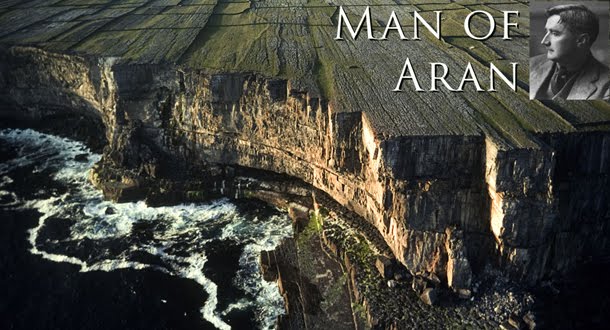 |
| Ralph Vaughan Williams and the setting of "Riders to the Sea." |
It's hard to think of a better match between composer and subject than Ralph Vaughan Williams and John Millington Synge's Riders to the Sea. And I'm quite sure the composer himself would agree, as in his libretto he hardly changed a word of Synge's text. Indeed, the tragic one-act, set on the shores of Inishmore (above), one of the windswept islands of Aran on Ireland's western coast, distills Williams's life-long musical obsessions into drama with almost eerie simplicity. Like the famed arranger of so many English folk tunes, Synge aimed to conjure the elemental mystery of the landscape through the harsh existence of those who lived upon it. And things don't get much harsher than they do in Riders, in which a mother must suffer the sea's taking of her last living son (although even in the spoken version, the crushing blows land somehow musically, thanks to the lyricism of Synge's keening dialogue).
So the piece stands as one of the most direct translations from drama to opera in existence; and it has also become accepted as Vaughan Williams's greatest achievement in the form - yet it has become a rarity in performance. Its brevity works against it, perhaps - along with its intensity. It's easy to pair two light operas to create a full evening, after all, but book-ending Riders to the Sea with a comedy would seem bizarre - and two tragedies of its power in a single night might lead some in the audience to slit their throats!
The Cantata Singers' solution to this problem was to offer a set of songs by Vaughan Williams (and others) as a prelude to their ambitious semi-staged production, which played in Jordan Hall for a single night last weekend. The chorus, one of Boston's finest, is actually well-known for its ambition; under the direction of David Hoose, the Cantata Singers generally offer year-long explorations of a single composer or musical movement. Thus Riders was only a highlight of a season devoted to Vaughan Williams and his fellow travelers (except for the chorus's next concert, in which they're taking a vacation by mounting Bach's Mass in B Minor!).
The songs served well enough as an opener, I suppose; although lovely - and lonely - as they were, they still didn't hint at the real darkness to come. Along with Vaughan Williams, we heard from Holst, Elgar, and Gerald Finzi (an undersung composer, so to speak, in my opinion). The chorus was in solid, if not superb, form throughout - at their strongest in the numbers with the sturdiest melodic lines, like Vaughan William's famous arrangement of the poignant "Loch Lomond" (led here by a touching solo from Richard Simpson) and Finzi's wonderful "My Spirit Sang All Day" (the one beam of sun, perhaps, in the whole program). Things were a bit more tentative in the slower and more complex textures of Holst's "The Evening-watch" and Vaughan Williams' settings from Shakespeare - although Hoose's direction, consistently subtle yet firm, still made everything worthwhile.
Then came Riders, which was staged (by Alexandra Borrie) with the orchestra surrounding the singers, just as the sea surrounds the opera's characters. As stage metaphor, this was quite striking - and as musical metaphor it was striking, too, as most of Riders to the Sea is a kind of flowing recitative sourced in the motifs of the wind and waves. Still, this theatrical coup came with a downside, for it must be noted that at times the singers had trouble cutting through the instrumental textures - even star mezzo Lynn Torgove, who took the central role of the mourning Maurya, sacrificed some of her complex timbre to the rise and fall of the winds (as well as an off-stage wind machine). In the end, however, Torgove proved memorable in the role - dramatically she was just right, and vocally proved quite gripping in her final scene, when the score edges closest to pure aria. There was also fine singing on offer from Lisa Lynch and Claire Filer as Maurya's despairing daughters, and under Hoose's direction, the instrumental ensemble sounded as strong, or stronger, than many a better-known local band.
All in all, I was quite taken with the thoughtfulness and care of the whole evening - and was sorry to hear it would only see one performance! Lovers of choral music would do well to keep an eye out for the rest of the Cantata Singers' season - in particular the May concert, which features Bernstein's hauntingly gorgeous Chichester Psalms; if you've never heard them, just take my word for it - you want to.
No comments:
Post a Comment